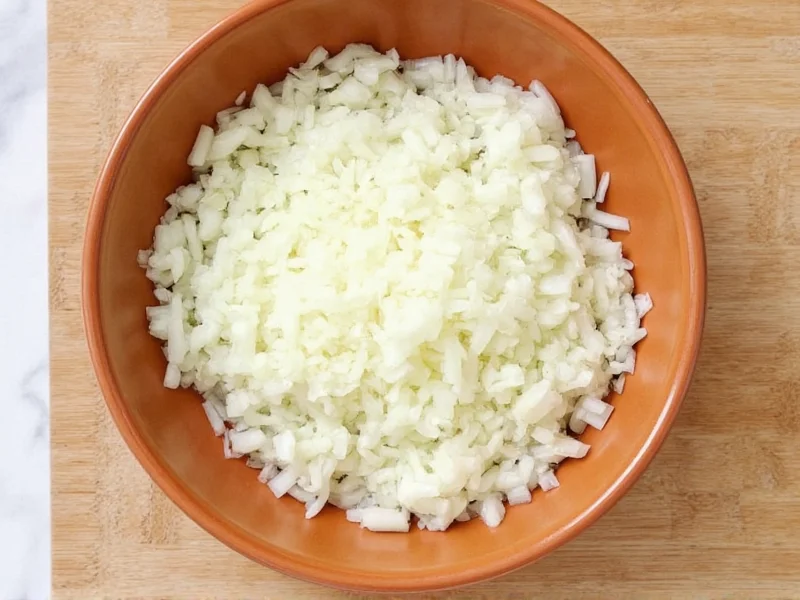Converting fresh onions to onion powder requires understanding the fundamental relationship between hydrated and dehydrated ingredients. When recipes call for chopped onions but you only have onion powder available, precise measurement conversion becomes essential for maintaining flavor integrity. The standard culinary conversion ratio states that 1 tablespoon (3 teaspoons) of onion powder equals approximately 1 cup of fresh chopped onion. Therefore, for 1/2 cup of chopped onion, you'll need exactly 1.5 teaspoons of onion powder.
| Fresh Chopped Onion | Onion Powder Equivalent | Conversion Ratio |
|---|---|---|
| 1 cup | 1 tablespoon (3 tsp) | 8:1 |
| 1/2 cup | 1.5 teaspoons | 8:1 |
| 1/4 cup | 3/4 teaspoon | 8:1 |
| 1/3 cup | 1 teaspoon | 8:1 |
Understanding Onion Conversion Science
The 8:1 conversion ratio between fresh chopped onion and onion powder exists because dehydration removes approximately 90% of the onion's water content while concentrating its flavor compounds. When substituting in recipes, this ratio prevents overpowering dishes with intense onion flavor while maintaining proper liquid balance. Professional chefs and food scientists confirm this standard conversion works reliably across most cooking applications.
When to Adjust the Standard Conversion
While the 1.5 teaspoons per 1/2 cup rule applies to most situations, certain factors may require slight adjustments:
- Recipe moisture content: In dry recipes like spice rubs or bread dough, use the full 1.5 teaspoons. In soups or stews with high liquid content, reduce to 1.25 teaspoons to prevent flavor dilution.
- Onion variety: Sweet onions like Vidalia contain more water, so use 1.75 teaspoons powder for 1/2 cup chopped. Pungent varieties like red onions require only 1.25 teaspoons.
- Cooking time: For dishes simmering over 30 minutes, reduce powder by 25% as flavors intensify during prolonged cooking.
Practical Substitution Guidelines
Successful onion substitution depends on proper technique. When replacing 1/2 cup chopped onion with powder:
- Always measure powder using proper teaspoon measurements - don't eyeball
- Mix powder with 1 tablespoon of water before adding to recipes for even distribution
- Add powder early in cooking for baked goods, but later in the process for sauces
- Taste and adjust after 5 minutes of cooking, as flavors continue developing
Advantages and Limitations of Onion Powder
Understanding when to use onion powder versus fresh onions improves cooking outcomes. Onion powder offers consistent flavor, longer shelf life (up to 3 years), and convenience for meal prepping. However, it lacks the textural element and subtle flavor variations of fresh onions. For dishes where texture matters like salsas or fresh salads, never substitute powder for fresh chopped onion.
Chef-developed recipes confirm that proper conversion of 1/2 cup chopped onion to powder maintains intended flavor profiles in cooked dishes. The key is recognizing that 1.5 teaspoons represents the starting point - always adjust based on your specific recipe requirements and personal taste preferences. This precise measurement conversion for 1/2 cup chopped onion to powder ensures your dishes maintain balanced flavor without onion overpowering.
Common Conversion Mistakes to Avoid
Many home cooks make critical errors when converting fresh onions to powder. The most frequent mistake involves using equal volume measurements (1/2 cup to 1/2 cup), which creates overwhelmingly strong onion flavor. Another common error is forgetting to adjust liquid content in recipes, leading to dry baked goods or thin sauces. Always remember that 1/2 cup chopped onion to powder requires only 1.5 teaspoons, not tablespoons or cups.
Storage Tips for Onion Powder
Proper storage maintains onion powder quality for accurate conversions. Keep powder in an airtight container away from light and heat. Quality powder should retain its potency for 2-3 years. Test older powder by rubbing a small amount between fingers - if it doesn't release a strong aroma, it's lost potency and won't provide accurate flavor equivalent to fresh onions. For precise 1/2 cup chopped onion to powder conversion, always use fresh, potent powder.
How much onion powder equals 1/2 cup chopped onion in recipes?
1.5 teaspoons of onion powder equals 1/2 cup of fresh chopped onion. This 8:1 conversion ratio accounts for the water removal during dehydration while maintaining proper flavor concentration in your dishes.
Can I substitute onion powder for fresh onions in all recipes?
No, onion powder works best in cooked dishes like soups, stews, and baked goods. Avoid substituting in raw applications like salads or salsas where fresh onion's texture and moisture are essential components of the dish.
Why does my dish taste too strong when I substitute onion powder?
This happens when using equal volume measurements instead of following the proper 8:1 conversion ratio. Remember that 1/2 cup chopped onion requires only 1.5 teaspoons of powder, not tablespoons. Overuse creates overpowering flavor as the concentrated compounds intensify during cooking.
How do I adjust recipes when converting 1/2 cup chopped onion to powder?
When substituting 1.5 teaspoons onion powder for 1/2 cup chopped onion, reduce other liquids by 1 tablespoon to compensate for the missing moisture. Add the powder early in cooking for baked goods, but later for sauces to prevent flavor degradation from prolonged heat exposure.
Does the type of onion affect the conversion to powder?
Yes, sweet onions like Vidalia contain more water, requiring slightly more powder (1.75 teaspoons for 1/2 cup). Pungent varieties like red onions need less (1.25 teaspoons) due to stronger flavor concentration. Always adjust based on onion variety for best results when converting 1/2 cup chopped onion to powder.











 浙公网安备
33010002000092号
浙公网安备
33010002000092号 浙B2-20120091-4
浙B2-20120091-4